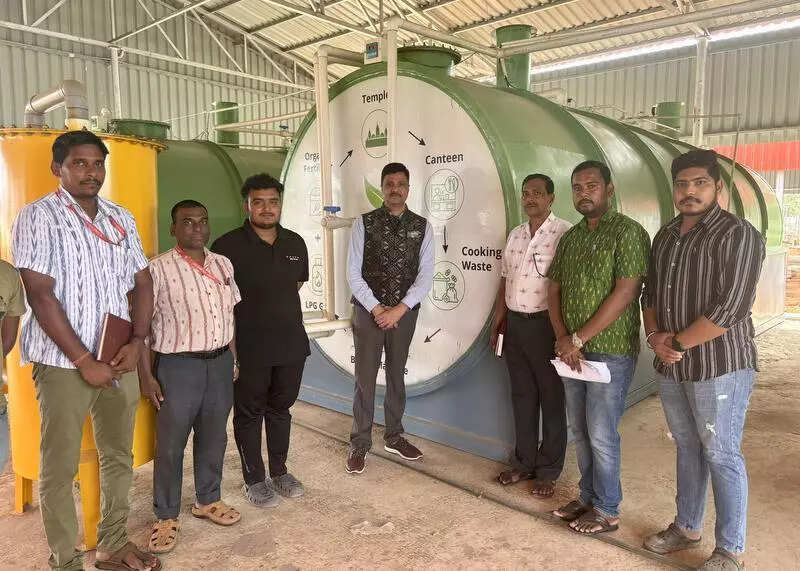Puri temple to transform waste into compost, biogas | Bhubaneswar News

Bhubaneswar: The discarded holy offerings at Puri Jagannath Temple, including leftover Mahaprasad, used flowers, tulasi leaves, and kitchen vegetable waste, will soon be processed at a new facility to produce compost and biogas, informed the temple’s chief administrator Arabinda Padhee.
Shree Jagannath Temple Administration (SJTA) states this eco-conscious initiative represents a crucial advancement in sustainable waste processing at this prominent Indian shrine.
The facility will transform various temple refuse into useful resources. Padhee explained to TOI: “The project aligns with traditional practices of treating temple offerings with respect while embracing modern waste management solutions”. SJTA indicated this initiative aims to ensure respectful disposal of sacred materials. Currently, the temple’s holy waste is collected by Puri municipality alongside other city refuse, including non-vegetarian food waste, and deposited at Baliapanda dumping yard.
The dedicated processing unit, under construction at Malatipatpur near Puri, will process three tonnes of temple waste daily, according to Padhee. “The Power Grid Corporation of India Limited has financially supported the establishment of the plant,” he added.
The temple normally generates 3 tonnes of waste daily, increasing it to 4 tonnes during festivals. This includes approximately 15 quintals of kitchen waste from one of India’s largest temple kitchens, capable of preparing over 30 varieties of Mahaprasad for 100,000 pilgrims daily. Current daily Mahaprasad production serves about 30,000 people. Additionally, Ananda Bazar, where Mahaprasad is sold, produces over 5 quintals of waste daily, plus 8 quintals of banana leaf plates. The main temple and sub-shrines receive about one quintal of tulasi leaves and flowers as offerings daily.
Padhee said protocols for waste collection, transport, and processing are being finalised, prioritising safety and environmental sustainability.
As per the plan, the biogas will generate electricity for operating the facility, with excess power being sold to the energy department.
The temple has installed garbage chutes on its north and south sides to facilitate waste transportation. Padhee said, “The compost produced will be used in temple gardens, promoting organic farming practices. The facility meets all environmental standards and maintains the sanctity of the offerings.”
He said plans are afoot to use discarded flowers and tulsi leaves for the making of incense sticks.
Shree Jagannath Temple Administration (SJTA) states this eco-conscious initiative represents a crucial advancement in sustainable waste processing at this prominent Indian shrine.
The facility will transform various temple refuse into useful resources. Padhee explained to TOI: “The project aligns with traditional practices of treating temple offerings with respect while embracing modern waste management solutions”. SJTA indicated this initiative aims to ensure respectful disposal of sacred materials. Currently, the temple’s holy waste is collected by Puri municipality alongside other city refuse, including non-vegetarian food waste, and deposited at Baliapanda dumping yard.
The dedicated processing unit, under construction at Malatipatpur near Puri, will process three tonnes of temple waste daily, according to Padhee. “The Power Grid Corporation of India Limited has financially supported the establishment of the plant,” he added.
The temple normally generates 3 tonnes of waste daily, increasing it to 4 tonnes during festivals. This includes approximately 15 quintals of kitchen waste from one of India’s largest temple kitchens, capable of preparing over 30 varieties of Mahaprasad for 100,000 pilgrims daily. Current daily Mahaprasad production serves about 30,000 people. Additionally, Ananda Bazar, where Mahaprasad is sold, produces over 5 quintals of waste daily, plus 8 quintals of banana leaf plates. The main temple and sub-shrines receive about one quintal of tulasi leaves and flowers as offerings daily.
Padhee said protocols for waste collection, transport, and processing are being finalised, prioritising safety and environmental sustainability.
As per the plan, the biogas will generate electricity for operating the facility, with excess power being sold to the energy department.
The temple has installed garbage chutes on its north and south sides to facilitate waste transportation. Padhee said, “The compost produced will be used in temple gardens, promoting organic farming practices. The facility meets all environmental standards and maintains the sanctity of the offerings.”
He said plans are afoot to use discarded flowers and tulsi leaves for the making of incense sticks.
















